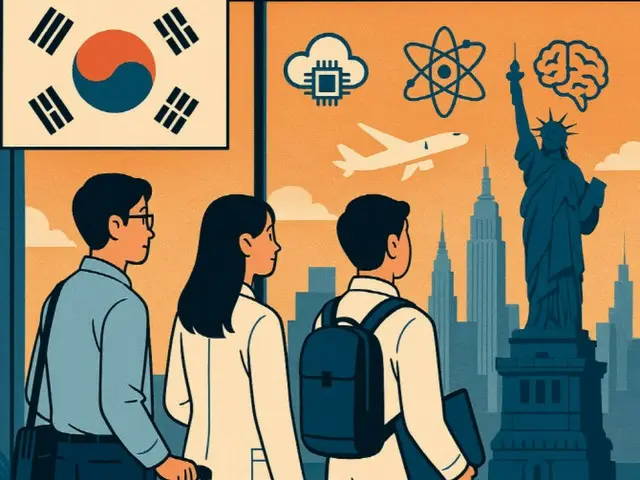While many of the top high school students go on to medical school, there is an outflow of science and engineering talent overseas, raising concerns about a decline in national competitiveness.
According to the report "BOK Lee SHOO Note: Determinants of overseas outflow of science and engineering talent and policy response directions" published by the Bank of Korea on the 3rd, science and engineering talent working in Korea
42.9% of the workforce are considering moving overseas within the next three years (including those currently in the process of changing jobs), and the ratio is 70% for those in their 20s and 30s.
This is the result of a questionnaire survey conducted on approximately 2,700 people with master's and doctoral degrees in science and engineering who are working both domestically and overseas.
Among these, the United States is the most active market. The number of Korean science and engineering PhD holders working in the United States has doubled in just over 10 years, from 9,000 in 2010 to 18,000 in 2021.
The number of US employment immigrants (EB-1, EB-2) visa holders as a percentage of the population with a degree or higher was the highest compared to major countries such as India, the UK, France, China, and Japan.
According to the survey results, the net outflow of science and engineering personnel has been expanding since 2015, mainly in the fields of biotechnology and information and communications technology (ICT).
The main reason was annual salary (66.7%). Although the difference in annual salary between Japan and overseas varies depending on the number of years of employment, on average, overseas salaries are more than twice as high.
More than half of respondents were "dissatisfied" or "very dissatisfied," while the figure for those working overseas was less than 20%.
Research ecosystems and networks (61.1%), and guaranteed opportunities (48.8%).
Non-financial factors were also cited as important reasons for considering a career abroad. Respondents cited aggressive financial rewards (28.8%) as a priority issue for the development of science and technology.
The Bank of Korea believes that talent in the science and technology fields is at the core of future growth industries such as digital transformation, artificial intelligence (AI), and advanced manufacturing.
In light of this, he emphasized that the outflow of science and engineering talent overseas should not be overlooked. Choi Jun, chief of the macro analysis team at the Research Bureau and lead author of the report, said, "Talent in the science and engineering fields is
"They are the core human resources that will form the foundation for sustainable economic growth through technological innovation and productivity improvement," he said, adding, "We are addressing structural risk factors that could weaken our country's technological innovation capabilities and growth momentum."
The academic community has pointed out that in order to prevent the outflow of science and engineering talent, the government should provide direct and bold support to top-level talent, while also providing substantial support to talented people in the private sector.
Some have suggested that institutional support needs to be put in place to ensure that the benefits are shared widely. Choi said, "In addition to shifting to a flexible salary and compensation system based on performance, the government should also take measures to improve the human capital of companies.
We can also consider measures to provide tax benefits such as income tax reductions for investments." "We will also develop predictable career tracks and overseas research opportunities so that master's-level talent can grow steadily domestically.
"Research and development (R&D) capabilities should be strengthened through increased interaction with institutions and researchers, and improved access to cutting-edge infrastructure," he advised.
Furthermore, "We will strengthen the foundations of technology startups and promote the development of security industries such as aerospace and defense."
Expanding an innovation ecosystem that utilizes strategic technologies in the disability sector will not only promote innovation but also prevent the loss of talent," he said, adding that Japan should take the examples of Israel and the United States as examples.
Israel has gradually opened up its defense technologies to the private sector, increasing market access. Meanwhile, the Defense Advanced Research Projects Agency (DARPA), under the U.S. Department of Defense, is pursuing high-risk and fundamental
From the early stages of technology development, we have collaborated with the private sector to institutionalize the path to commercialization.
2025/11/04 10:36 KST
Copyrights(C) Edaily wowkorea.jp 88

